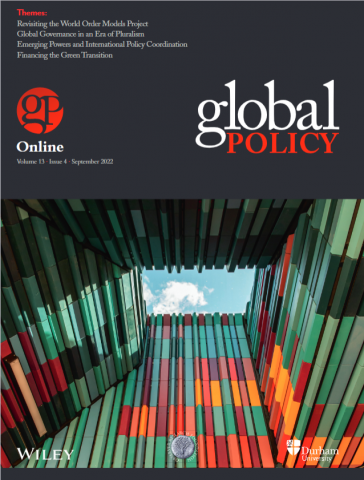The September 2022 issue of Global Policy includes research articles on, among others, refugee policy, south-south solidarity at the WTO, special economic zones, global shocks and coordinated policy responses, and economic growth in South Asia. There is also a practitioners’ special section on financing green transitions in times of crisis edited by Mariane Søndergaard-Jensen and Andreas Klasen.
Research Articles
Revisiting the World Order Models Project: A Case for Renewal? - Aaron McKeil
Refugee Policy Amidst Global Shocks: Encampment, Resettlement Barriers and the Search for ‘Durable Solutions’ - Samuel J. Spiegel and Johanne Mhlanga
Digital Nativity and Digital Diplomacy: Exploring Conceptual Differences Between Digital Natives and Digital Immigrants - Ilan Manor and Ronit Kampf
Global shocks and international policy coordination - Ashima Goyal and Rupayan Pal
Emerging Powers, Leadership, and South–South Solidarity: The Battle Over Special and Differential Treatment at the WTO - Kristen Hopewell
The Intricacies of Firms’ Support for Labor Provisions in US Trade Agreements - Rodrigo Fagundes Cezar
What Determines the Heterogeneous Performance of Special Economic Zones? Evidence from Sub‐Sahara Africa - Douglas Zhihua Zeng
Globalization and Economic Growth: A Sustainability Analysis for South Asian Countries - Yuanzhi Liu, Akintoye Victor Adejumo, Oluwabunmi Opeyemi Adejumo and Timothy Ayomitunde Aderemi
Practitioners’ Special Section
Introduction to the practitioners' special section: Financing the green transition in times of crisis - Mariane Søndergaard-Jensen and Andreas Klasen
Incorporating sustainability as a cross‐cutting vector in the design of public policies - Xiana Méndez
Export credit agencies delivering finance for the green transition in times of crisis - Peder Lundquist
Leading an ECA through climate transformation: A President's perspective - Mairead Lavery
ECA’s roles to foster green and energy transition in emerging and developing countries - Yuichiro Akita
Transiting to green growth in fossil export‐dependent economies: A pathway for Africa - Benedict Oramah
Leveraging aid for trade to mobilize climate finance in the least developed countries - Ratnakar Adhikari
Managing the green transition: The role of the OECD export credit arrangement - Marion Jansen
The role of the global financial system in financing the transition to net zero - Alex Michie
Policy Insights
Global Governance in an Era of Pluralism - Ian Johnstone and Joshua Lincoln
Governing and Measuring Health Security: The Global Push for Pandemic Preparedness Indicators - Alexander E. Kentikelenis and Leonard Seabrooke
Crisis and state investment funds with expiration dates: Risks and opportunities in a decarbonization context - Juergen Braunstein
Mister Chips goes to Brussels: On the Pros and Cons of a Semiconductor Policy in the EU - Bob Hancké and Angela Garcia Calvo
Joint Initiative on Services Domestic Regulation in the WTO: The Case of Russia - Olga Biryukova
Presidential diplomacy meets science diplomacy - Diego Lawler and Miguel Fuentes
Practitioner Commentary
Are the Indicators of the New Urban Agenda Failing Us? - Jari Lyytimäki, Hanna Nieminen, Nufar Finel, Elina Nyberg and Tapio Reinikainen
Response Article
International Organizations' Policy Response to COVID‐19 in Longer Terms - Suyu Liu
Corrigendum
Russia, Central Asia and Non‐traditional Security Threats from Afghanistan following the US Withdrawal - Ekaterina Stepanova
